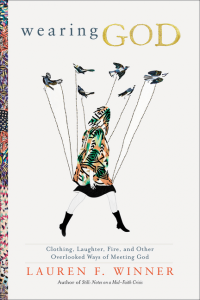Thanks to everyone who read Wearing God by Lauren Winner. I’m looking forward to hearing what you thought of the book!
Here’s how it works: I’ll throw out a few topics for discussion, and you can write your responses about these topics (or anything else you’d like to say) in the comment section.
I have been a fan of Lauren Winner’s writing for years (I loved Girl Meets God, and I had the privilege of hearing her speak at The Festival of Faith and Writing several years ago). As someone who finds it hard to get my brain around something as big and mysterious and intangible as the nature of God, I am constantly seeking metaphors and analogies to piece together a truer understanding of him. I was excited to read Winner’s book about some of the more obscure or overlooked metaphors the Bible uses to describe God’s character.
Discussion #1: Images of God
Lauren Winner says that as a Christian community, we tend to overemphasize certain names/metaphors for God (Shepherd, King, Father) while overlooking others that would help give us a more fleshed-out picture of his character. She explores the idea of God as clothing, smell, bread and wine, a laboring woman, laughter, and fire, and unpacks these metaphors in striking ways.
I began to realize that my pictures of God were old. They were not old in the sense of antique champagne flutes, which are abundant with significance precisely because they are old. . . . Rather, they were old like a seventh-grade health textbook from 1963: moderately interesting for what it might say about culture and science in 1963, but generally out of date.
Do you agree that some of our images of God are old and worn out? Which image/metaphor of God do you resonate with most (either from this book or in general)?
Discussion #2: Scandalous Comparisons
I have to admit that some of the metaphors for God made me a little squeamish. Really, isn’t it a little undignified to picture the God of the universe as a pregnant woman agonizing in a birthing room? And isn’t it, well, indecorous to think of God wanting us to become drunk on him? But as I read, it occurred to me that that’s exactly the point. We tend to put God in a tidy little box so we can pin him down and understand him, but over and over the Bible blows our minds with how God is so far beyond our comprehension.
This is why Jesus is hymned not as grape juice but as wine: because He is dangerous and excessive.
Were there any images for God that didn’t sit well with you? Why or why not?
Discussion #3: Redefining Goodness
As I read this book, it occurred to me that one of the reasons we tend to shy away from certain metaphors about God is because they don’t seem to line up with our view of a good God. If God is fire, doesn’t that indicate he has the power to destroy as well as create? We are scared of this idea of an untamable God, so we stick to metaphors that we perceive as less threatening. But Winner gives us broader perspective, reminding us that while yes, God is good, that doesn’t mean we’ll never experience pain or hardship.
Maybe, if God is fire, we are a grove of ponderosa pines. Without the heat and burn of God’s flame, our pinecones would remain closed tight around the seeds that are needed for our thriving and growth and new life.
Have you ever seen God as fire in your life, not only bringing warmth but also purifying you?
Discussion #4: God as One Who Hides
One of the final descriptions the author offers of God is as one who hides. She quotes Isaiah as saying “You are a God who hides himself”—Deus absconditus.
Sometimes God hides. Sometimes what I might first name as God’s absence is in fact God’s hiding. In a sense, God hides amid all the many divine metaphors and similes that litter the scriptures. This is a God who conceals and reveals.
Have you ever experienced a season when it seems that God is hiding? How are you encouraged by this promise in Jeremiah: “When you search for me, you will find me”?
Discussion #5: Rating
I would give this book 4 stars out of 5. I don’t agree with all of the author’s theology, but I appreciate the way she tackles some intriguing (and often difficult) pictures of God. This book got me thinking about God’s character more deeply, and I found myself connecting with him in new ways as a result.
How many stars would you give this book?
Remember: There will a giveaway for a free book for one lucky commenter!

This book was both disturbing and eye opening to me. I almost didn’t get past the beginning. I personally am from an era when we said postman meaning in general man or woman. I don’t have a problem calling God “he.” After I got over that I was glad I continued on. She had many ways of looking at God that were unconventional but yet a good exercise for us to do often so we don’t peg God in a hole. He is so much bigger and more amazing than we could ever grasp. Overall I am glad I read the book to widen my thoughts and scope. Anytime God has me see Him as more than I can imagine is good. I would give three star out of five for tackling a tough topic.
I agree, Nancy, the author really started on a soap box at the beginning. Glad you pressed on!